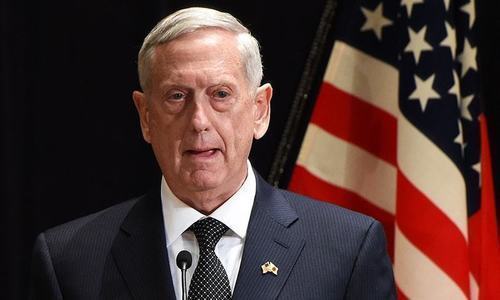SYDNEY: Washington wants to quickly deploy new intermediate-range missiles in Asia, US Defence Secretary Mark Esper said on Saturday in a move likely to anger China.
The new Pentagon chief said the US was now free to deploy the weapons following its withdrawal Friday from the Intermediate-Range Nuclear Forces (INF) treaty with Russia.
“Yes I would like to,” Esper said when asked if the US was considering deploying new medium-range conventional weapons in Asia.
“We would like to deploy a capability sooner rather than later,” Esper told reporters on a plane to Sydney at the start of a week-long tour of Asia.
“I would prefer months... But these things tend to take longer than you expect.” The plan to deploy new missiles in Asia is likely to anger China which is vying with Washington for influence in the region, but Esper said Beijing should not be surprised.
“That should be no surprise because we have been talking about that for some time now,” he said. “And I want to say that 80 percent of their inventory is INF range systems.
So that should not surprise that we would want to have a like capability,” he said. But Esper stressed the US was not embarking on a new arms race.
“The traditional sense of an arms race has been in a nuclear context,” he said.
“Right now, we don’t have plans to build nuclear-tipped INF range weapons.
It’s the Russians who have developed non-compliant likely, possibly nuclear-tipped weapons,” he said.
“So I don’t see an arms race happening. I do see us taking corrective measures to develop a capability that we need for both the European theatre and this theatre, the Indo-Pac-Com theatre.”
The INF treaty was considered a cornerstone of the global arms control architecture but the United States said the bilateral pact had given other countries — namely China — free rein to develop their own long-range missiles.
The rise of a militarily more assertive China in the region has worried traditional US allies such as Australia and New Zealand, and Beijing’s actions in the South China Sea have alarmed neighbours with competing territorial claims to the strategic waterway.
Esper did not specify where the US intended to deploy the weapons.
“I would not speculate because those things depend on plans, it’s those things you always discuss with your allies,” he said.
Esper said he chose Asia for his first trip since taking office on July 23 “to affirm our commitment to the region, to reassure our allies and our partners.” The Pentagon chief and US Secretary of State Mike Pompeo are due to meet with their Australian counterparts on Sunday.
Washington withdrew from the INF treaty on Friday after accusing Russia of violating it for years.
Under the pact signed in 1987 by then US president Ronald Reagan and Soviet leader Mikhail Gorbachev, Washington and Moscow agreed to limit the use of conventional and nuclear medium-range missiles (with a range of 500-5,000 kilometres).
But its unravelling had been on the cards for months amid worsening ties between Russia and the US.
Published in Dawn, August 4th, 2019














































